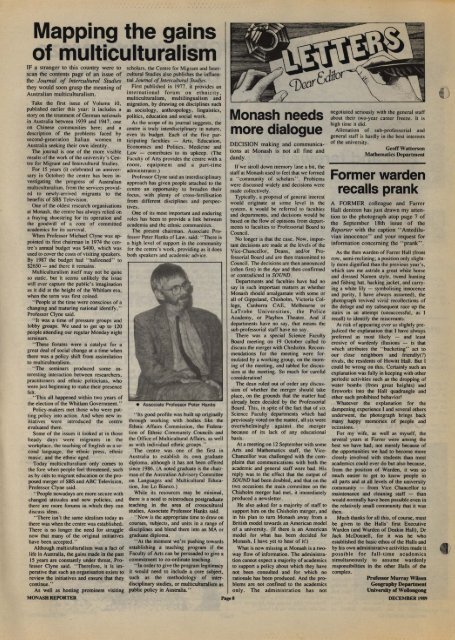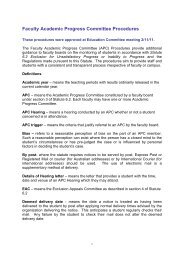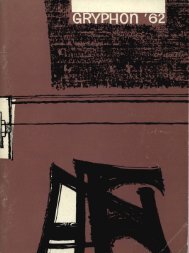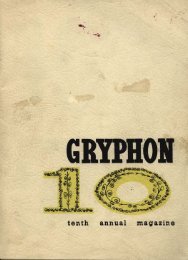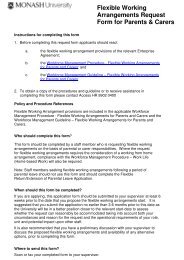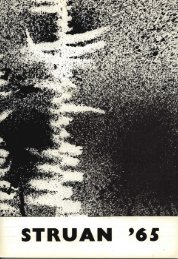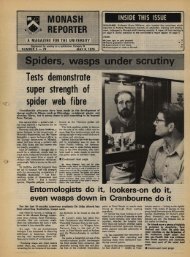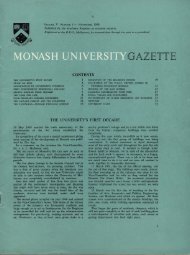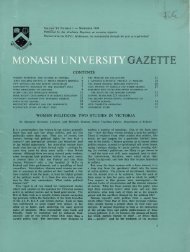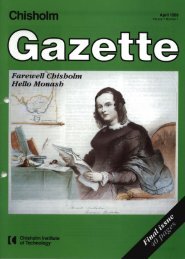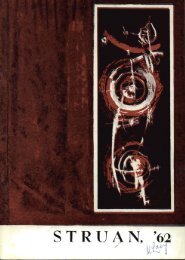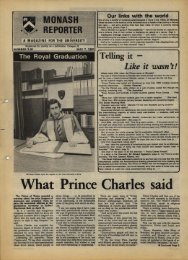Structure of the new university. begins to emerge - Adm.monash.edu ...
Structure of the new university. begins to emerge - Adm.monash.edu ...
Structure of the new university. begins to emerge - Adm.monash.edu ...
You also want an ePaper? Increase the reach of your titles
YUMPU automatically turns print PDFs into web optimized ePapers that Google loves.
Mapping <strong>the</strong> gains <strong>of</strong> multiculturalism IF a stranger <strong>to</strong> this country were <strong>to</strong>scan <strong>the</strong> contents page <strong>of</strong> an issue <strong>of</strong><strong>the</strong> Journal <strong>of</strong> Intercultural Studies<strong>the</strong>y would soon grasp <strong>the</strong> meaning <strong>of</strong>Australian multiculturalism.Take <strong>the</strong> first issue <strong>of</strong> Volume 10,published earlier this year: it includes as<strong>to</strong>ry on <strong>the</strong> treatment <strong>of</strong> German nationalsin Australia between 1939 and 1947; oneon Chinese communities here; and adescriplion <strong>of</strong> <strong>the</strong> problems faced bysecond-generation Italian women inAustralia seeking <strong>the</strong>ir own identity.The journal is one <strong>of</strong> <strong>the</strong> more visibleresults <strong>of</strong> <strong>the</strong> work <strong>of</strong> <strong>the</strong> <strong>university</strong>'s Centrefor Migrant and Intercultural Studies.For 15 years (it celebrated an anniversaryin Oc<strong>to</strong>ber) <strong>the</strong> centre has been investigating<strong>the</strong> progress <strong>of</strong> Australianmuhiculturalism, from <strong>the</strong> services provided<strong>to</strong> <strong>new</strong>ly-arrived migrants <strong>to</strong> <strong>the</strong>benefits <strong>of</strong> SBS Television.One <strong>of</strong> <strong>the</strong> oldest research organisationsat Monash, <strong>the</strong> centre has always relied ona fraying shoestring for its operation and<strong>the</strong> goodwill <strong>of</strong> a core <strong>of</strong> committedacademics for its survival.When Pr<strong>of</strong>essor Michael Clyne was appointedits first chainnan in 1974 <strong>the</strong> centre'sannual budget was $400. which wasused <strong>to</strong> cover <strong>the</strong> costs <strong>of</strong> visiting speakers.By 1987 <strong>the</strong> budget had "ballooned" <strong>to</strong>$2650 - and <strong>the</strong>re it remains.Multiculturalism itself may not be quiteso static, but it seems unlikely <strong>the</strong> issuewill ever capture <strong>the</strong> public's imaginationas it did at <strong>the</strong> height <strong>of</strong> <strong>the</strong> Whitlam era,when <strong>the</strong> term was first coined." People at <strong>the</strong> time were conscious <strong>of</strong> achanging and maturing national identify. "Pr<strong>of</strong>essor Clyne said...It was a time <strong>of</strong> pressure groups andlobby groups. We used <strong>to</strong> get up <strong>to</strong> 120people attending our regular Monday nightseminars."These forums were a catalyst for agreat deal <strong>of</strong> social change at a time when<strong>the</strong>re was a policy shift from assimilation<strong>to</strong> multiculturalism."The seminars produced some interestinginteraction between researchers,practitioners and ethnic politicians, whowere just beginning <strong>to</strong> make <strong>the</strong>ir presencefelt."This all happened within two years <strong>of</strong><strong>the</strong> election <strong>of</strong> <strong>the</strong> Whitlam Government."POlicy-makers met those who were puttingpolicy in<strong>to</strong> action. And when <strong>new</strong> initiativeswere introduced <strong>the</strong> centreevaluated <strong>the</strong>m .Some <strong>of</strong> <strong>the</strong> issues it looked at in thoseheady days were migrants in <strong>the</strong>workplace, <strong>the</strong> teaching <strong>of</strong> English as a secondlanguage. <strong>the</strong> ethnic press, ethnicmusic. and <strong>the</strong> ethnic aged.Tooay multiculturaliam only comes <strong>to</strong><strong>the</strong> fore when people feel threatened, suchas by cuts <strong>to</strong> migrant <strong>edu</strong>cation or <strong>the</strong> proposedmerger <strong>of</strong> SBS and ABC Television.Pr<strong>of</strong>essor Clyne said."People nowadays are more secure withchanged aUilUdes and <strong>new</strong> policies. and<strong>the</strong>re are more forums in which <strong>the</strong>y candiscuss ideas."There isn't <strong>the</strong> same idealism <strong>to</strong>oay as<strong>the</strong>re was when <strong>the</strong> centre was establ ished.There is no longer <strong>the</strong> need for slrugglenow that many <strong>of</strong> <strong>the</strong> original initiativeshave been accepted ...Although multiculturalism was a fact <strong>of</strong>life in Australia. <strong>the</strong> gains made in <strong>the</strong> past15 years are constantly under threat. Pr<strong>of</strong>essorClyne said. "Therefore, it is imperativethat such an organisation exists <strong>to</strong>review <strong>the</strong> initiatives and ensure that <strong>the</strong>ycontinue...As well as hosting prominent visitingscholars. <strong>the</strong> Centre for Migrant and InterculturalStudies also publishes <strong>the</strong> influentialJournal <strong>of</strong> Intercultural Studies.First published in 1977. it provides aninternational forum on ethnicity.multiculturalism, multilingualism andmigration. by drawing on disciplines suchas sociology. anthropology. linguistics.politics. <strong>edu</strong>cation and social work.As <strong>the</strong> scope <strong>of</strong> its journal suggests. <strong>the</strong>centre is truly inlerdisciplinary in nature.even its budget. Each <strong>of</strong> <strong>the</strong> five participatingfaculties - Arts. Education,Economics and Politics. Medicine andLaw - contributes <strong>to</strong> its upkeep. (TheFaculty <strong>of</strong> Arts provides <strong>the</strong> centre with aroom. equipment and a part-timeadministra<strong>to</strong>r.)Pr<strong>of</strong>essor Clyne said an interdisciplinaryapproach has given people 31tached <strong>to</strong> <strong>the</strong>centre an opportunily <strong>to</strong> broaden <strong>the</strong>irfocus. with plenty <strong>of</strong> cross-fertilisationfrom different disciplines and perspectives.One <strong>of</strong> its most important and enduringroles has been <strong>to</strong> provide a link betweenacademia and <strong>the</strong> ethnic communities.The present chairman. Associate Pr<strong>of</strong>essorPeter Hanks <strong>of</strong> Law. said: "There isa high level <strong>of</strong> support in <strong>the</strong> communityfor <strong>the</strong> centre's work. providing as it doesboth speakers and academic advice.• ASSOCiate Pr<strong>of</strong>essor Peter Hanks"lts good pr<strong>of</strong>ile was built up originallythrough working with bodies like <strong>the</strong>Ethnic Affairs Commission, <strong>the</strong> Federa·tion <strong>of</strong> Ethnic Community Councils and<strong>the</strong> Office <strong>of</strong> Multicultural Affairs. as wellas with individual ethnic groups ...The centre was one <strong>of</strong> <strong>the</strong> first inAustralia <strong>to</strong> establish its own graduatediploma. although it has not been <strong>of</strong>feredsince 1986. (A noted graduale is <strong>the</strong> chairman<strong>of</strong> <strong>the</strong> Australian Advisory Committeeon Languages and Multicultural Education.Joe Lo Bianco.)While its resources may be minimal,<strong>the</strong>re is a need <strong>to</strong> reintroduce postgraduateteaching in <strong>the</strong> area <strong>of</strong> crossculturalstudies, Associate Pr<strong>of</strong>essor Hanks said."Now is <strong>the</strong> appropriate time <strong>to</strong> draw oncourses, subjects, and units in a range <strong>of</strong>disciplines and blend <strong>the</strong>m in<strong>to</strong> an MA orgraduate diploma." At <strong>the</strong> moment we' re pushing <strong>to</strong>wardsestablishing a teaching program if <strong>the</strong>Faculty <strong>of</strong> Ans can be persuaded <strong>to</strong> give acommitment <strong>to</strong> co-ordinate teaching."In order <strong>to</strong> give <strong>the</strong> program legitimacyit would need <strong>to</strong> include a core subject,such as <strong>the</strong> methodology <strong>of</strong> interdisciplinarystudies, or multiculturalism aspublic policy in Australia ...Monash needsmore dialogueDECISION making and communicationsat Monash is not all fine anddandy.If we stroll down memory lane a bit. <strong>the</strong>staff at Monash used <strong>to</strong> feel that we formeda "community <strong>of</strong> scholars". Problemswere discussed widely and decisions weremade collectively.Typically. a proposal <strong>of</strong> general interestwould originate at some level in <strong>the</strong>system. it would be referred 10 facuhiesand departments. and decisions would bebased on <strong>the</strong> flow <strong>of</strong> opinions from departments<strong>to</strong> faculties <strong>to</strong> Pr<strong>of</strong>essorial Board <strong>to</strong>Council.No longer is that <strong>the</strong> case. Now. imporlantdecisions are made at <strong>the</strong> levels <strong>of</strong> <strong>the</strong>Vice-Chancellor, Deans, and/or Pr<strong>of</strong>essorialBoard and are <strong>the</strong>n transmitted <strong>to</strong>Council. The decisions are <strong>the</strong>n announced(<strong>of</strong>ten first) in <strong>the</strong> Age and <strong>the</strong>n confirmedor contradicted in SOUND.Depanments and faculties have had nosay in such important matters as whe<strong>the</strong>rMonash should amalgamate with some orall <strong>of</strong> Gippsland, Chisholm, Vic<strong>to</strong>ria College,Canberra CAE, Melbourne orLaTrobe Universities. <strong>the</strong> PoliceAcademy, or Playbox Theatre. And ifdepartments have no say. that means <strong>the</strong>sub-pr<strong>of</strong>essorial staff have no say.There was a special Science FacultyBoard meeting on 19 Oc<strong>to</strong>ber called <strong>to</strong>discuss <strong>the</strong> merger with Chisholm. Recommendationsfor <strong>the</strong> meeting were formulatedby a working group, on <strong>the</strong> morning<strong>of</strong> <strong>the</strong> meeling. and tabled for discussionat <strong>the</strong> meeting. So much for carefulconsideration!The dean ruled out <strong>of</strong> order any discussion<strong>of</strong> whe<strong>the</strong>r <strong>the</strong> merger should takeplace, on <strong>the</strong> grounds that <strong>the</strong> matter hadalready been decided by <strong>the</strong> Pr<strong>of</strong>essorialBoard. This. in spite <strong>of</strong> <strong>the</strong> fact that <strong>of</strong> sixScience Faculty departments which hadpreviously voted on <strong>the</strong> matter, all six wereoverwhelmingly against <strong>the</strong> mergerbecause <strong>of</strong> its lack <strong>of</strong> any <strong>edu</strong>cationalbasis.At a meeting on 12 September with someAns and Ma<strong>the</strong>matics staff, <strong>the</strong> ViceChancellor was challenged with <strong>the</strong> complaintthat communications with both <strong>the</strong>academic and general staff were bad. Hisreply was <strong>to</strong> <strong>the</strong> effect that <strong>the</strong> output <strong>of</strong>SOUND had been doubled, and that on <strong>the</strong>two occasions <strong>the</strong> main committee on <strong>the</strong>Chisholm merger had met. it immediatelyproduced a <strong>new</strong>sletter.He also asked for a majority <strong>of</strong> staff <strong>to</strong>support him on <strong>the</strong> Chisholm merger, andin his plan <strong>to</strong> tum Monash away from aBritish model <strong>to</strong>wards an American mooel<strong>of</strong> a <strong>university</strong>. (If <strong>the</strong>re is an Americanmodel for what has been decided forMonash. I have yet <strong>to</strong> hear <strong>of</strong> it!)What is now missing at Monash is a twowayflow <strong>of</strong> information. The administrationcannot expect a majority <strong>of</strong> academics<strong>to</strong> support a policy about which <strong>the</strong>y havenot been consulted and for which norationale has been produced. And <strong>the</strong> problemsare not confined <strong>to</strong> <strong>the</strong> academicsonly. The administration has notnegOli


